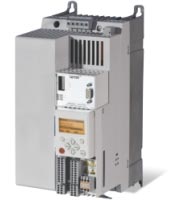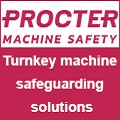
Posted to News on 18th Jun 2012, 12:30
Inverters include energy-saving technology for no extra cost
Optimum efficiency for standard AC asynchronous motors is achieved around full load, and the efficiency falls steeply at partial loads; however, Lenze says that for machinery with substantial load variations, reduced running costs can be achieved by using the company's 8400 series frequency inverters.

A factor that is slowing the take-up of energy-saving technologies is the reluctance for companies to invest, even though the payback times are usually short. However for some types of machinery, designers can incorporate drives that reduce running costs by up to 30 per cent, without the need for additional expenditure. This is possible for conveyors, pumps, fans and other applications where there are substantial variations in the load. Here the Lenze 8400 series frequency inverters can give these major savings by adapting the motor magnetisation currents to match the varying loads. The feature is called VFC eco and it is standard for the 8400 range at no extra cost.
It is a fact of life with standard AC asynchronous motors that optimum efficiency is achieved around full load, and the efficiency falls steeply at partial loads, particularly below 40 per cent. The reason relates to the magnetisation currents. For such cases running directly on-line or even in vector control by frequency inverters, the magnetisation current remains constant when the load reduces. Magnetisation currents result in copper and iron losses, which are the main factors influencing the motor's efficiency. Where the running load falls to 20 per cent of full load, the loss in efficiency is often greater than 30 per cent.
The VFC eco feature is a switchable software option included in the 8400 series of cabinet and decentralised inverters. Effectively it is a loss-optimised algorithm that maintains a constant power factor either at fixed or variable frequencies. It is most effective in a range between 5 and 60 per cent of full load. Here there are significant savings; for example a typical motor efficiency at 20 per cent load might be 53 per cent without VFC eco, and 70 per cent with.

In the diagrams above, it can be seen how the motor currents change as the load changes. Normally when a motor goes from full to partial load, the stator current Iq (also known as the torque producing current) reduces. However, the motor current Id, which is the magnetisation current, remains unchanged. With inverter control the applied voltage Us will also decrease. Note that at partial load the angle increases. As the efficiency of the motor is proportional to the Cos (the Power Factor), the efficiency has therefore decreased.
With VFC eco enabled, the magnetisation current Id reduces. Torque is a function of Id x Iq so, for a fixed load, there area in the triangle remains constant with Iq increasing. However, the important factor is that the angle is restored virtually to the original full load value. The smaller angle means that the Power Factor and efficiency stay high.
Airport baggage conveyors are typical applications with varying loads and low dynamics that suit VFC eco. They run continuously at fixed speed and can be full of suitcases at one minute, then empty at the next. Without VFC eco the motor efficiency will vary with load from typically 85 per cent down to 60 per cent. With VFC eco switched on, the efficiency level will hold up at about 80 per cent.
Test data
Actual tests made on a roller conveyor prove the 30 per cent energy savings. The conveyor was driven by an inverter and an 0.75kW IE2 motor. Varying light loads up to 20 per cent of maximum gave consistent savings above the 30 per cent level.
tstart{c,80%}
thead{Conveyor load|0 kg|500 kg|1000 kg}
tdata{Power without VFC eco|190W|210W|250W}
tdata{Power with VFC eco|130W|140W|170W}
tdata{Savings|32%|33%|32%}
tend{}
VFCeco not only suits drives that run at constant speed; it gives an additional advantage for variable-speed machinery by substantially extending the efficient working range of the motor. The effect can be seen in the graphic below, which charts the efficiency of a 1.1kW IE2 helical geared motor. There is a big gain in efficiency particularly in the region 10-35 per cent full speed and 20-40 per cent load.

VFC eco is most effective for motor powers from 0.75-3.0kW, although it is worth investigating for powers in a range 0.37-4.0kW. Lenze DSD (Drive Solution Designer) software can simulate the application and identify the running costs with and without it. DSD takes in all the details of the machine application and gives graphical displays of drives profiles and energy usage with direct comparison of alternatives. It becomes easy to optimise the drive for purchase cost and running cost. An output of DSD is the Energy Certificate which reveals payback periods and lifetime running costs.
The VFC eco software option is available free of charge on Lenze 8400 series frequency inverters, offering the potential for energy savings of up to 30 per cent. Successful applications have highly variable loads, low dynamics and are usually in a power range 0.75-3.0 kW. 8400 series inverters suit cabinet mounting and are additionally available as IP65 enclosed decentralised drives. Drive packages of inverter with IE2 motor and energy-efficient gearboxes can also be supplied.
Follow the link for more information about Lenze 8400 series frequency inverters.
Want the latest machine building news straight to your inbox? Become a MachineBuilding member for free today >>















